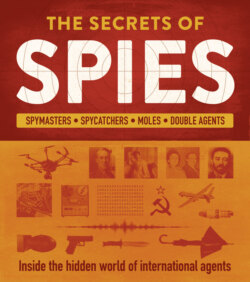Читать книгу The Secrets of Spies - Weldon Owen - Страница 55
На сайте Литреса книга снята с продажи.
ОглавлениеTHE GROWTH OF
PROFESSIONAL
INTELLIGENCE
CHAPTER 3 NINETEENTHCENTURY INTELLIGENCE
56
Prior to the 1800s, most intelligence services and spy networks were formed ad hoc
to deal with rising issues or conflicts, and disbanded in peacetime or after their
investigations ended. But after the near-constant warring periods of the eighteenth
century, wherein at least two major powers were in conflict with one another at almost
any given moment, intelligence groups likewise began to expand and develop.
As tensions continued to rise between European and other
nations throughout the nineteenth century, so too did each
power’s investment into permanent intelligence services.
The Austro-Hungarian Empire was the first to create a truly
permanent office for military intelligence—the Evidenzbüro
was founded in 1850, with a subordinate group, known
as the Kundschaftsbüro, established to keep an eye
on foreign nations. Britain followed Austria,
with the Topographical and Statistical
Department created during the Crimean
War in 1854 (later reorganized into
the War Office’s Intelligence Branch
in 1873); next came the French
Ministry of War’s Deuxième
Bureau in 1871, supplemented
by the national police.
THE RUSSIAN OKHRANA
Along with developments
in standing intelligence
departments, permanent
counterintelligence offices also
came into being. Spying on
foreign powers was their main
task, but sometimes they also
suppressed internal dissent. One
example was the Department for
Protecting Public Security and
Order, or Okhrana (the Russian word
for “security”). This office was formed
in 1866 in St. Petersburg, and later
expanded to offices in Moscow and
Warsaw in 1881, after Tsar Alexander II
was assassinated. The Okhrana cracked down hard
on the terrorist group responsible along with leftist
organizations, engaged in union-busting. It also allegedly
drafted The Protocols of the Elders of Zion, a text of
antisemitic propaganda.
The Okhrana’s activities extended well beyond
the Motherland. Its Foreign Agency spied on
revolutionaries outside Russia, sent agents to
foment disorder, and intercepted private
letters, even deciphering British and
German military and diplomatic codes.
However, divided between military
counterintelligence and suppressing
anti-Tsarist activity during the
1904–1905 Russo-Japanese War,
the Okhrana failed in both
arenas. Ultimately, Russia
ceased hostilities months
before Japan would have
entered an economic crisis, and
growing revolutionary forces
were emboldened by the
Okhrana’s attempts to stop
them. Japan ultimately gained
greater dominance over the
western Pacific. The Okhrana
itself was dissolved after its
headquarters were looted and
burned by revolutionaries in 1917.
Left: Tsar Alexander II of Russia was
assassinated in 1881, prompting a rapid
expansion in Russian secret services.
